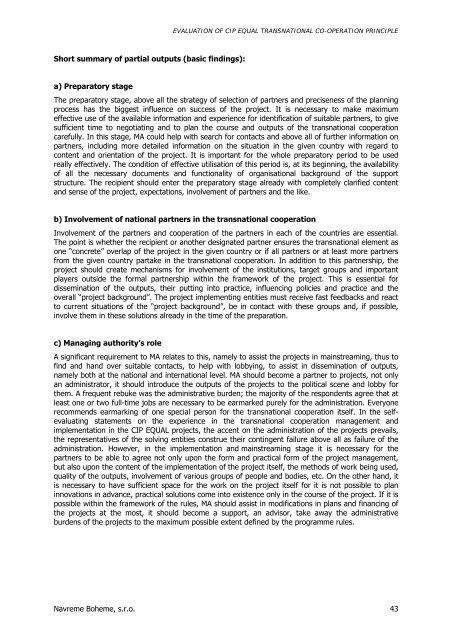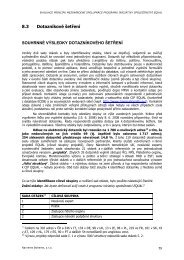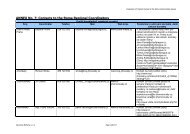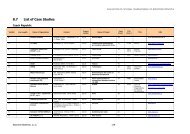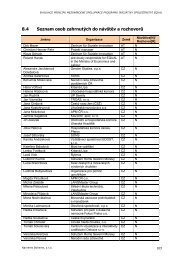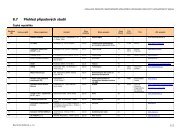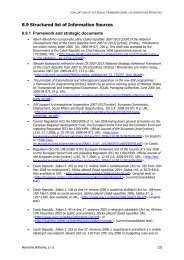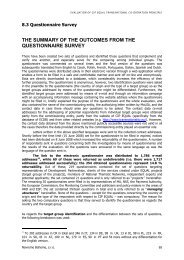EQUAL - Final report - eng - navreme
EQUAL - Final report - eng - navreme
EQUAL - Final report - eng - navreme
Create successful ePaper yourself
Turn your PDF publications into a flip-book with our unique Google optimized e-Paper software.
Short summary of partial outputs (basic findings):<br />
EVALUATION OF CIP <strong>EQUAL</strong> TRANSNATIONAL CO-OPERATION PRINCIPLE<br />
a) Preparatory stage<br />
The preparatory stage, above all the strategy of selection of partners and preciseness of the planning<br />
process has the biggest influence on success of the project. It is necessary to make maximum<br />
effective use of the available information and experience for identification of suitable partners, to give<br />
sufficient time to negotiating and to plan the course and outputs of the transnational cooperation<br />
carefully. In this stage, MA could help with search for contacts and above all of further information on<br />
partners, including more detailed information on the situation in the given country with regard to<br />
content and orientation of the project. It is important for the whole preparatory period to be used<br />
really effectively. The condition of effective utilisation of this period is, at its beginning, the availability<br />
of all the necessary documents and functionality of organisational background of the support<br />
structure. The recipient should enter the preparatory stage already with completely clarified content<br />
and sense of the project, expectations, involvement of partners and the like.<br />
b) Involvement of national partners in the transnational cooperation<br />
Involvement of the partners and cooperation of the partners in each of the countries are essential.<br />
The point is whether the recipient or another designated partner ensures the transnational element as<br />
one “concrete” overlap of the project in the given country or if all partners or at least more partners<br />
from the given country partake in the transnational cooperation. In addition to this partnership, the<br />
project should create mechanisms for involvement of the institutions, target groups and important<br />
players outside the formal partnership within the framework of the project. This is essential for<br />
dissemination of the outputs, their putting into practice, influencing policies and practice and the<br />
overall “project background”. The project implementing entities must receive fast feedbacks and react<br />
to current situations of the “project background”, be in contact with these groups and, if possible,<br />
involve them in these solutions already in the time of the preparation.<br />
c) Managing authority’s role<br />
A significant requirement to MA relates to this, namely to assist the projects in mainstreaming, thus to<br />
find and hand over suitable contacts, to help with lobbying, to assist in dissemination of outputs,<br />
namely both at the national and international level. MA should become a partner to projects, not only<br />
an administrator, it should introduce the outputs of the projects to the political scene and lobby for<br />
them. A frequent rebuke was the administrative burden; the majority of the respondents agree that at<br />
least one or two full-time jobs are necessary to be earmarked purely for the administration. Everyone<br />
recommends earmarking of one special person for the transnational cooperation itself. In the selfevaluating<br />
statements on the experience in the transnational cooperation management and<br />
implementation in the CIP <strong>EQUAL</strong> projects, the accent on the administration of the projects prevails,<br />
the representatives of the solving entities construe their contingent failure above all as failure of the<br />
administration. However, in the implementation and mainstreaming stage it is necessary for the<br />
partners to be able to agree not only upon the form and practical form of the project management,<br />
but also upon the content of the implementation of the project itself, the methods of work being used,<br />
quality of the outputs, involvement of various groups of people and bodies, etc. On the other hand, it<br />
is necessary to have sufficient space for the work on the project itself for it is not possible to plan<br />
innovations in advance, practical solutions come into existence only in the course of the project. If it is<br />
possible within the framework of the rules, MA should assist in modifications in plans and financing of<br />
the projects at the most, it should become a support, an advisor, take away the administrative<br />
burdens of the projects to the maximum possible extent defined by the programme rules.<br />
Navreme Boheme, s.r.o. 43


